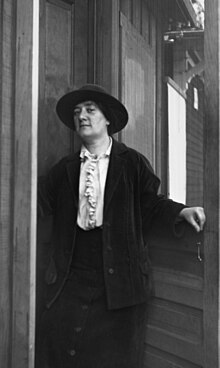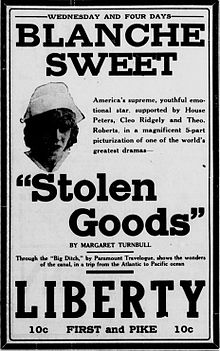Margaret Turnbull (screenwriter): Difference between revisions
m childhhood→childhood - Correct typos in one click |
Tassedethe (talk | contribs) m v2.05 - Repaired 1 link to disambiguation page - (You can help) - Magda (film) |
||
| Line 45: | Line 45: | ||
* ''[[The Victory of Conscience]]'' (1916) |
* ''[[The Victory of Conscience]]'' (1916) |
||
* ''[[Shirley Kaye]]'' (1917) |
* ''[[Shirley Kaye]]'' (1917) |
||
* ''[[Magda (film)|Magda]]'' (1917) |
* ''[[Magda (1917 film)|Magda]]'' (1917) |
||
* ''[[Lost and Won (1917 film)|Lost and Won]]'' (1917) |
* ''[[Lost and Won (1917 film)|Lost and Won]]'' (1917) |
||
* ''[[The Shuttle (film)|The Shuttle]]'' (1918) |
* ''[[The Shuttle (film)|The Shuttle]]'' (1918) |
||
Revision as of 00:49, 6 March 2023
Margaret Turnbull | |
|---|---|
 Margaret Turnbull in 1915 | |
| Born | 17 November 1872 Glasgow, Scotland |
| Died | 12 June 1942 (aged 69) |
| Occupation | Writer |
| Years active | 1914-1939 |
Margaret Turnbull (17 November 1872 – 12 June 1942) was a Scottish novelist, playwright and screenwriter in silent films.[1]
Early life
Turnbull was born in Glasgow, Scotland.[2] She was the older sister of producer Hector Turnbull and sister to Jean, Mary, Alice, Donald,[3] and Isabel.[4] Her family moved to the United States during her childhood, and she attended school in New Jersey.[5]
Career
Turnbull wrote plays, including Genessee of the Hills (1905), A Society Policeman (1905), Classmates (1907, with William C. deMille), On the Square (1913, with her brother), The Deadlock (1913), and At the Mitre (1914). In 1912, a script she submitted anonymously was produced in New York by Henry Wilson Savage, as The Stronger Claim.[6]
Turnbull wrote for 51 films between 1914 and 1939. She worked for Paramount Pictures and the Famous Players-Lasky Studios in Islington, and also spent some of her career in Hollywood.[7] In 1915, she wrote at least three films that starred Blanche Sweet; she also wrote films starring Edna Goodrich and Enrico Caruso. She was described as a "popular writer" and William C. deMille's assistant in a 1915 article about film dramas.[8]
Turnbull also wrote novels, including W. A. G.'s Tale (1913),[9] Looking After Sandy (1915),[10][11] The Close Up (1918),[12][13] Alabaster Lamps (1925)[14] Madame Judas (1926),[2] The Left Lady (1926),[15]The Handsome Man (1930),[16] and The Bride's Mirror (1934).[17] "I am sure," she told an interviewer in 1926, "that I get much more pleasure in writing a book or play than Mr. Ford has ever gotten from all the machines he has put on the market."[2]
Personal life
Turnbull lived in Bucks County, Pennsylvania.[2] She died in Yarmouth Port, Massachusetts in 1942, aged 69 years.[1]
Selected filmography

- The Fighting Hope (1915)
- Armstrong's Wife (1915)
- Blackbirds (1915)
- The Secret Sin (1915)
- The Unknown (1915)
- Stolen Goods (1915)
- The Clue (1915)
- To Have and to Hold (1916)
- Alien Souls (1916)
- Public Opinion (1916)
- The Victory of Conscience (1916)
- Shirley Kaye (1917)
- Magda (1917)
- Lost and Won (1917)
- The Shuttle (1918)
- My Cousin (1918)[18]
- The Two Brides (1919)
- The Tree of Knowledge (1920)
- The Bonnie Brier Bush (1921)
- The Princess of New York (1921)
- The Mystery Road (1921)
- Appearances (1921)
- Three Live Ghosts (1922)
- La Bataille (1923)[19]
- Rogue's March (1928)[20]
References
- ^ a b Delahousse, Sarah (2013). "Margaret Turnbull". Women Film Pioneers Project. Retrieved 3 October 2016.
- ^ a b c d "Margaret Turnbull at Home". The Daily News. 28 May 1926. p. 4. Retrieved 28 July 2020 – via Newspapers.com.
- ^ "Hector Turnbull Called by Death". The Morning Call. 9 April 1934. p. 5. Retrieved 28 July 2020 – via Newspapers.com.
- ^ "Obituary for William J. Cooley (Aged 55)". The Philadelphia Inquirer. 28 March 1933. p. 25. Retrieved 28 July 2020 – via Newspapers.com.
- ^ Turnbull, Margaret (16 December 1926). "Alabaster Lamps". The Salem Post and The Democrat-Bulletin. p. 6. Retrieved 28 July 2020 – via Newspapers.com.
- ^ "Theatrical Notes". Hartford Courant. 2 September 1912. p. 7. Retrieved 28 July 2020 – via Newspapers.com.
- ^ "Movie Notes". The Times Herald. 6 June 1919. p. 3. Retrieved 28 July 2020 – via Newspapers.com.
- ^ Kingsley, Grace (14 March 1915). "Day of the Photodrama". The Los Angeles Times. p. 45. Retrieved 28 July 2020 – via Newspapers.com.
- ^ Turnbull, Margaret (1 February 2006). W. A. G.'s Tale.
- ^ "Wholesome, Helpful Girl". The Boston Globe. 10 October 1914. p. 4. Retrieved 28 July 2020 – via Newspapers.com.
- ^ Turnbull, Margaret (1914). "Looking After Sandy: A Simple Romance". Internet Archive. Retrieved 28 July 2020.
- ^ "The Close-up". The European Library. The European Library. Retrieved 3 October 2016.
- ^ "The Book Corner". The San Bernardino County Sun. 24 December 1918. p. 6. Retrieved 28 July 2020 – via Newspapers.com.
- ^ "Alabaster Lamps". The European Library. The European Library. Retrieved 3 October 2016.
- ^ Turnbull, Margaret (1926). "The Left Lady". Faded Page. Retrieved 28 July 2020.
- ^ Turnbull, Margaret (11 December 1930). "The Handsome Man, part V". The Blocton Enterprise. p. 3. Retrieved 28 July 2020 – via Newspapers.com.
- ^ "The Bride's Mirror". The European Library. The European Library. Retrieved 3 October 2016.
- ^ "At the Regent". Harrisburg Telegraph. 11 January 1919. p. 10. Retrieved 28 July 2020 – via Newspapers.com.
- ^ "La BATAILLE (1923)". BFI.org. BFI. Retrieved 3 October 2016.
- ^ "Rogue's March is First Class" Spokane Chronicle (May 18, 1928): 4. via Newspapers.com.
External links
- 1872 births
- 1942 deaths
- Film people from Glasgow
- Scottish screenwriters
- British women screenwriters
- Scottish women dramatists and playwrights
- 20th-century British dramatists and playwrights
- 20th-century British women writers
- 20th-century Scottish dramatists and playwrights
- Women film pioneers
- 20th-century British screenwriters
- 20th-century Scottish women
- Writers from Glasgow
